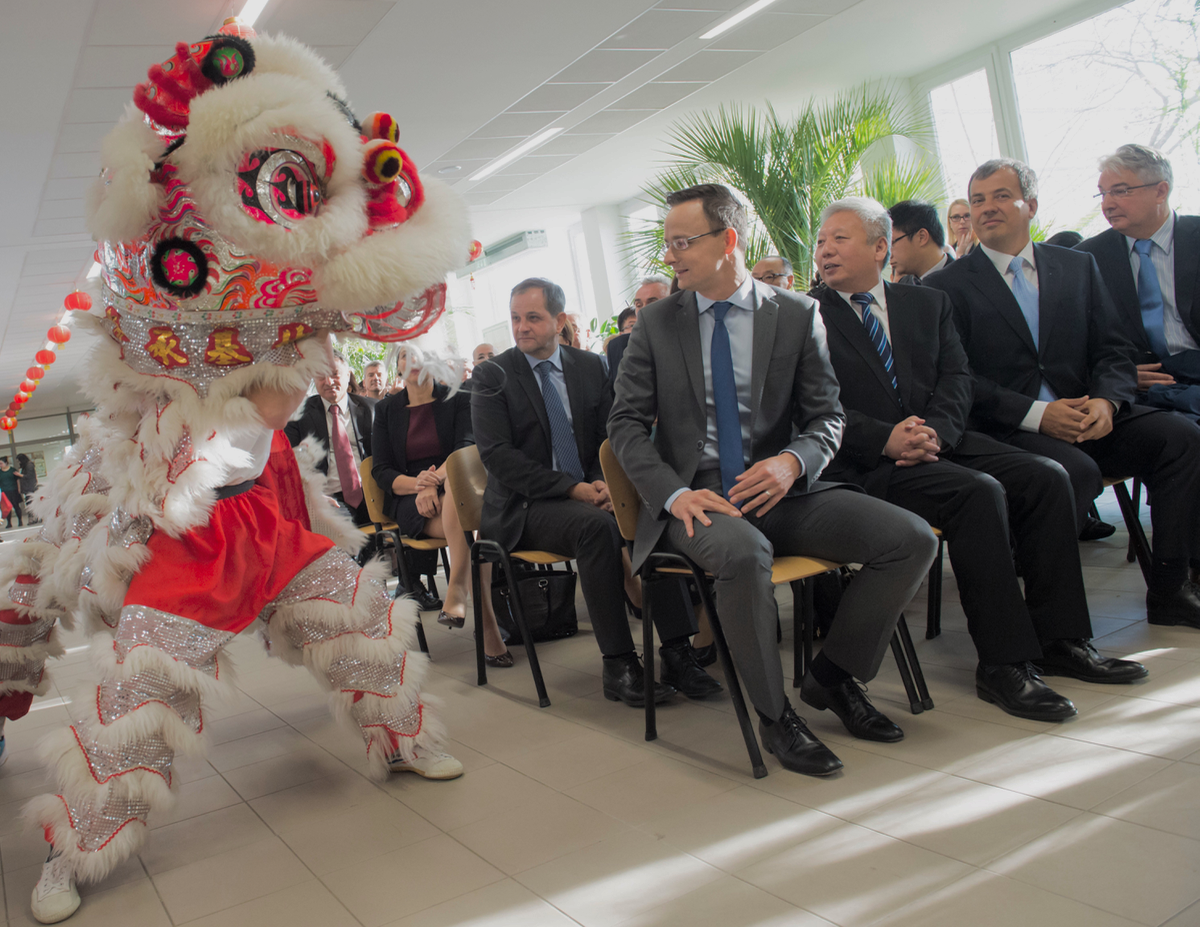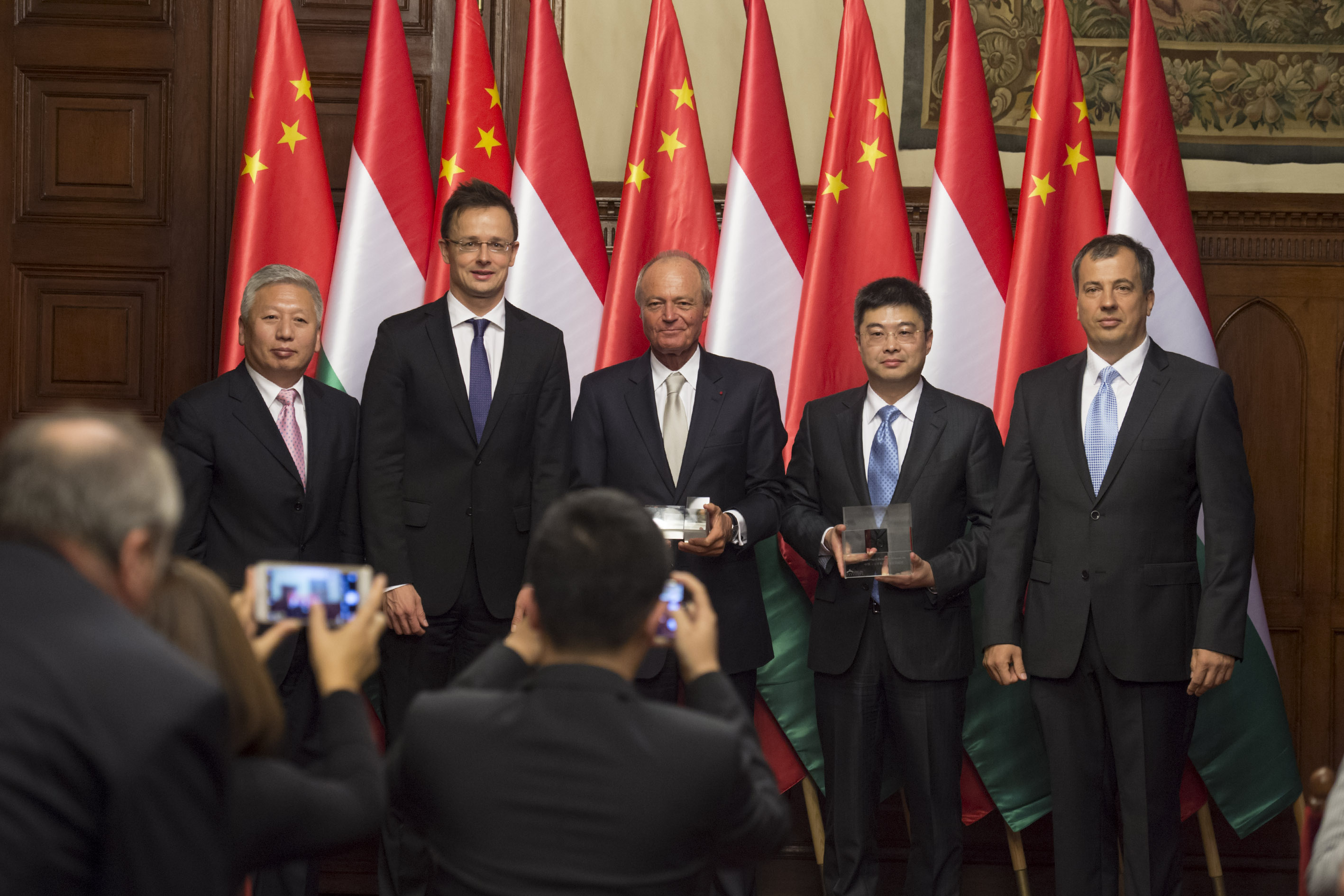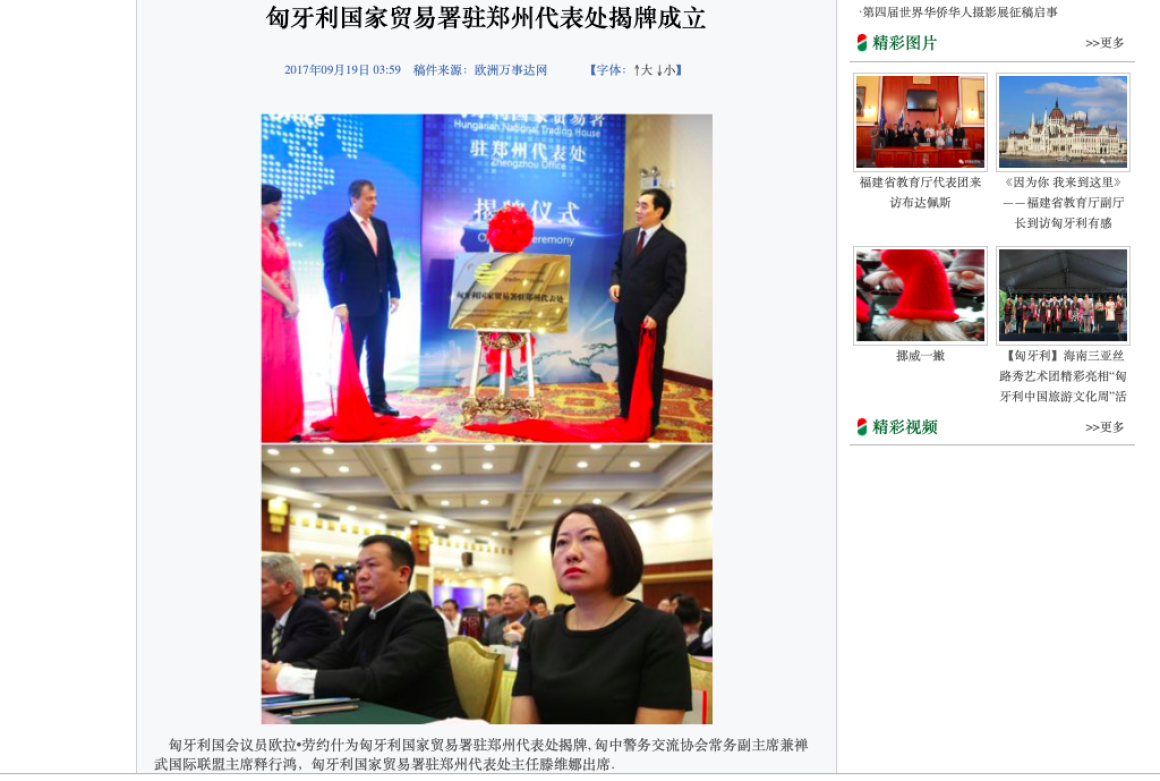MP of Hungary’s strongest opposition party has ties to the government’s controversial trading house business

In September 2017, a Hungarian trading house was inaugurated in Eastern China, in the city of Zhengzhou. The office was part of a network established by the Hungarian government, with the goal of boosting the export of Hungarian companies. However, instead of a member of the governing Fidesz party, it was an opposition politician who took the main role at the event: a golden board with the name of the new office was unveiled by Lajos Oláh, a member of the Democratic Coalition (DK), which has become the strongest opposition party in recent months.
Although DK has repeatedly criticized the scandal-ridden trading house network, Oláh has repeatedly appeared close to it. Direkt36 has found a link between the politician’s environment and the officials of a company that used to operate Hungarian trading houses in China before 2018. Although last year the trading house system underwent a major overhaul, it remained connected to Oláh: offices in China are now operated by an acquaintance of Oláh, for 23 million forints (70 thousand euros) per month.
In the area of Chinese relations, Oláh established an apparently harmonious relationship with the government. One of the spectacular signs of this is the Great Wall Hungarian-Chinese Friendship Association, led by Oláh. The organization was established in 2012, its members included several well-known Hungarian entrepreneurs and its events are frequently attended by Minister of Foreign Affairs Péter Szijjártó. On one such occasion, Szijjártó was talking about how the government and the opposition think similarly about many issues.
Oláh Lajos told Direkt36 that he had started to deal with China, and he has never consulted with the government about his viewpoints. He said that he is not involved in the work of the trading houses “in any way”. He attended the opening ceremony of the office in Zhengzhou upon the request of the Hungarian embassy in China, but he was not involved in organizing the event.
The state company responsible for export development said that the Zhengzhou office did not receive any state support, there was only professional cooperation between the office and the state company’s predecessor. The Ministry of Foreign Affairs did not respond to our questions.
Oláh is not the only opposition politician in Hungary who, in the background, has managed to get close to the government’s businesses. Direkt36 earlier reported that the companies of Gergő Czeglédy, a politician of the Hungarian Socialist Party (MSZP), received orders from state-owned companies together with members of the Fidesz business circle.
He chose China consciously
The 50-year-old Lajos Oláh’s political career started in MSZP in the early 2000s. In 2003, he was elected as one of the party’s local presidents in Hajdú-Bihar, an Eastern county of Hungary. He became an MP in 2006, and, under the socialist governments (2002-2010), he served as secretary of state for the environment, then later for transport, communications and energy.
In October 2011 – when the socialists were already in opposition – Oláh was one of ten MPs that left MSZP after former Prime Minister Ferenc Gyurcsány announced that he would establish a new party, DK. Oláh never belonged to Gyurcsány’s closest circles, bur he maintained a close friendship with some confidants of the former PM. Although Oláh is not a front-line politician of DK, he was able to win a parliamentary seat in a central-Budapest individual constituency both in 2014 and 2018.
His acquaintances describe Oláh as a pragmatic person who is good at networking and is able to mediate between opposing parties. An acquaintance described him as a “businessman”, who “navigates according to business principles also in politics”. Many pointed out that although Oláh currently has no business interests, his family members own several profitable companies.
There are more than a dozen companies in which the politician’s wife and brother used to have or still have interest. One of the most interesting of these is Rossimo Ltd, producing over 1 billion forints (3 million euros) of annual revenue in recent years. The company, which manages hotels, dormitories and workers’ accommodations, was majority-owned by the politician’s brother until October 2018. Last January, it was reported that the company signed a four-billion-forint (12-million-euro) framework contract with the Budapest Metropolitan Police to house policemen. The contract was won in consortium with one it the companies of Lőrinc Mészáros, a close friend of PM Viktor Orbán.
The Great Wall
It was apparently also for pragmatic reasons that Lajos Oláh became interested in China. One of his close acquaintances said that, as a career politician, Oláh was deliberately looking for a potentially fashionable issue that could offer him opportunities. This is how the politician, who loves traveling and hiking, discovered China for himself. He became a member of the Hungarian-Chinese Friendship Group of the Parliament already in 2006, and, since last year, he is the vice-president of the group.

Source: Facebook’s page of Great Wall Hungarian-Chinese Friendship Association
According to his friends, Oláh likes to boast about how he entrenched himself in this area. “When we meet, he usually talks about his upcoming journeys to China, or the next Chinese delegation coming here,” one of them said. According to the source, Oláh can speak with great enthusiasm about China’s revival as a major global power. He thinks that “China is the future”, and this is why he considered important that his children also learn Chinese. Another old friend said that when they met in Budapest a few years ago, Oláh told them that he wanted to set up a Chinese medicine center in Hungary. Oláh told Direkt36 that he indeed supported an initiative to establish a Chinese-Indian health centre, but the project was not implemented in the end. Oláh is currently a board member of the Traditional Chinese Medicine Foundation for European Health, founded in 2013 by former PM Péter Medgyessy.
Oláh told Direkt36 that he travels to China once or twice a year, for example when he is “invited to give lectures at universities or to attend cultural events”. He said that these trips are never financed from public money. However, he did receive some help from the Foreign Ministry: ahead of his official visits, the ministry’s staff prepared briefings”. In an earlier interview, Szijjártó also said that his ministry is happy to help MPs to prepare for their official trips abroad, regardless of their political affiliation.
It is not common, however, that Fidesz politicians appear and speak publicly in great harmony with the members of the opposition. Thus, it is also unusual that Szijjártó regularly attends the events of Oláh’s association, the Great Wall Hungarian-Chinese Friendship Association. The organization was established in 2012 with the aim to develop economic, diplomatic and cultural relations between the two countries and also to cooperate with the Chinese community living in Hungary.
Oláh is currently one of the chairmen of the association, while the other is Cao Heping, a Chinese businessman who has bought several stores in Hungary in recent years.
Several prominent entrepreneurs have been members of the association, including Róbert Cselovszki, chairman of Erste Investment Ltd, billionaire Ferenc Kedves, a wealthy pet food producer, and Miklós Ináncsy, a businessman who had sold lands to Adnan Polat, a Turkish friend of Viktor Orbán.
It was also at the initiative of the association that the so-called Chinese-Hungarian Friendship Award was established, which annually recognizes those that have done a lot for Chinese-Hungarian relations. Lajos Oláh said in an interview that Szijjártó had also supported the initiative.
Oláh said that “in line with international diplomatic practice,” the current foreign minister and the current Chinese ambassador are asked to award the prizes. Szijjártó regularly attends the award ceremony. He participated in the very first event held in the parliament in 2013, when he was a Secretary of State of the Prime Minister’s Office. He said at the event that “the strengthening of Hungarian-Chinese relations should not be a questions of party politics, the government and the opposition are working together in the issue of cooperation with China”. Szijjártó also attended the event in 2015, when former socialist PM Péter Medgyessy received an award.

Péter Medgyessy in the middle, Lajos Oláh on the right, Péter Szijjártó the second from left
Trading Houses in China
Oláh also has other ties to the government: he has several acquaintances around the trading house network, overseen by the Ministry of Foreign Affairs.
The Hungarian government created the Hungarian National Trading House Ltd. (MNKH) at the end of 2012, as part of its so-called Eastern Opening Policy, an attempt to reorient the country’s trade policy. The MNKH contracted private companies to operate local trading houses around the world, with the aim of supporting the export activities of Hungarian small and medium-sized enterprises.
In 2016, a company called Asia Projects Ltd. won a contract to operate trading houses in China. Magyar Nemzet reported the MNKH had already concluded a strategic agreement with the company before announcing the result of the tender, in spite of the fact that the company had no revenue before.
It was not reported, however, that the company had links to Oláh’s environment. The owner of the company that won the tender was Tamás Polyák, who had been a business partner of Oláh’s brother for many years. (When the brother of Oláh became the co-owner of Party Ice Hungary Ltd. in 2014, Polyák was also elected as one of the managers of the company.) Oláh did not respond to Direkt36’s questions whether he knows Polyák, but he noted that he does not follow his business activities and he does not do business with him.
However, Polyák did not stay in the company for long. A few weeks after Asia Projects won the trading house tender worth more than 200 million forints (0,6 million euros), Polyák sold his shares to a Chinese-owned company. Later on, however, another person who is in contact with Oláh appeared in Asia Projects Ltd. She is Teng Wei Na, who became the manager of the trading house company in June 2018.
The 47-year-old Chinese woman living in Hungary is the vice-president of the Hungarian-Chinese Cultural Association, while her brother is the editor of a popular Chinese weekly newspaper in Hungary, New Herald. Teng Wei Na was earlier awarded by Károly Kontrát, the State Secretary of the Ministry of the Interior, for her
“invaluable translation services”
provided for the Hungarian Police Sport Association. Earlier this year, the pro-government TV2 also invited her to a morning show to talk about the traditions and typical dishes of the Chinese New Year.
Teng Wei Na and Oláh told Direkt36 that they had met “many years ago” at an event of the Hungarian-Chinese bilingual school. They are friends on Facebook, and we have identified several events that they had both attended. Both were present in 2016 when the association of Oláh – in the presence of Szijjártó and the Chinese ambassador – signed a cooperation agreement with a school and a cultural association for a Chinese-Hungarian student exchange program. They also both attended the opening ceremony of the Hungarian trading house office in Zhengzhou in September 2017. According to Oláh, the Chinese article that reported about the event contained factual mistakes, so he had the article removed from the website. However, it is visible on the original pictures and videos that Oláh and Teng Wei Na were present at the event, and that – together with a Chinese official – Oláh was the one unveiling a golden board with the name of the new office.

Oláh Lajos on the top right, Teng Wei Na below and right, The source: www.wsd.hu
Oláh told Direkt36 that he was invited to Zhengzhou by the “local Chinese leaders” to hold a lecture at a university, and he attended the opening ceremony of the local trading house upon the request of the Hungarian embassy. According to Oláh, this event was actually a conference, where he also gave a presentation, and he was asked to participate in the unveiling “probably because he was the highest-ranking Hungarian attendee of the event”. Oláh claimed that the embassy had earlier informed him that the Hungarian state does not provide financing neither for the event, nor for the office of the trading house. According to Teng Wei Na, she opened the office “together with her friends and the local municipality”.
Oláh’s acquaintance in the new system
However, the operation of the trading house system was tainted by severe financial losses and various scandals. For example, it was reported that several companies contracted by MNKH were owned by people close to the government. Opposition parties, including DK, fiercely criticised the system.
Last summer, the government decided to revamp the trading house network. The old contracts for operating trading houses were terminated, and it was announced that a new export promotion network would be set up, covering larger regions. (Direkt36 revealed in March that the government only made an exception with the company of Adnan Polat, Viktor Orbán’s Turkish friend: his contract was the only one that remained in effect.)
So far, new tenders have been announced for four regions: China, Japan, Russia and the Balkans. The tender for China – worth 23 million forints monthly (70 thousand euros) and also covering Malaysia, Singapore and Indonesia – was awarded last autumn to Europe Asia Ltd. The company had been established just two months before winning the tender. The company’s owner, however, is not unknown on the market: it is Oláh’s acquaintance, Teng Wei Na, the same woman that had also participated in the old trading house system.
Oláh has never spoken publicly about the trading houses, he rather expresses his interest in Chinese culture and emphasises the importance of Chinese language teaching.
He claims to have talked about similar topics when the Chinese Foreign Minister visited Hungary, and met Viktor Orbán, Péter Szijjártó and also Oláh Lajos. It is unclear what exactly happened at this meeting, because – in spite of the fact that Oláh was the only opposition politician who met with the Chinese foreign minister – neither DK, neither Oláh issued press releases about the meeting. Oláh only reacted when news website Azonnali revealed that the meeting actually happened: he said that at the meeting, they “mainly talked about issues that are mostly connected to his private life”. He told Direkt36 that he could only share details of the meeting if he had preliminary agreed on that with the Chinese foreign minister. As this did not happen, he could only say that their topics were education and culture.
Karen Chang contributed to this report.
For the Hungarian company data we used the services of Opten.

